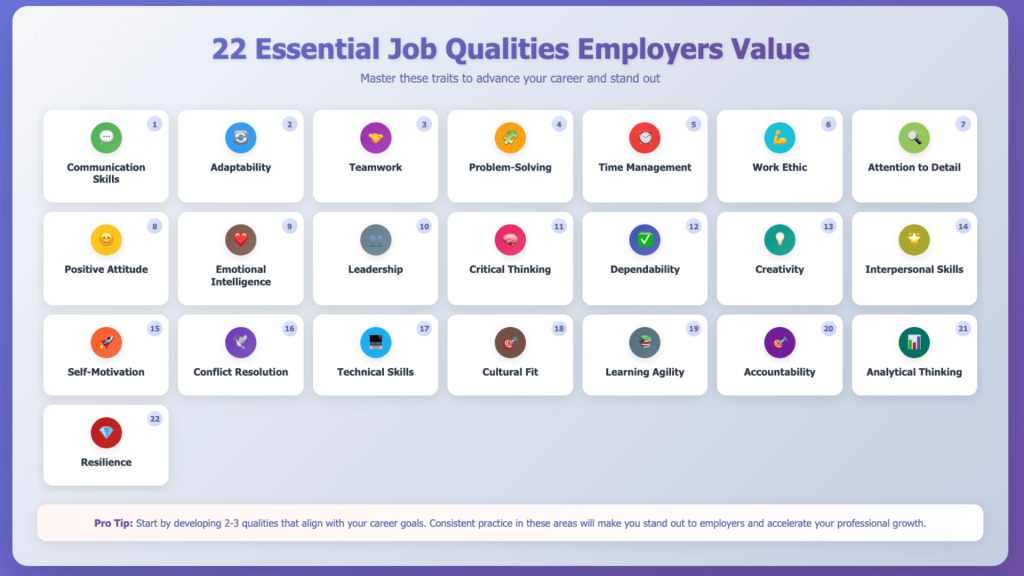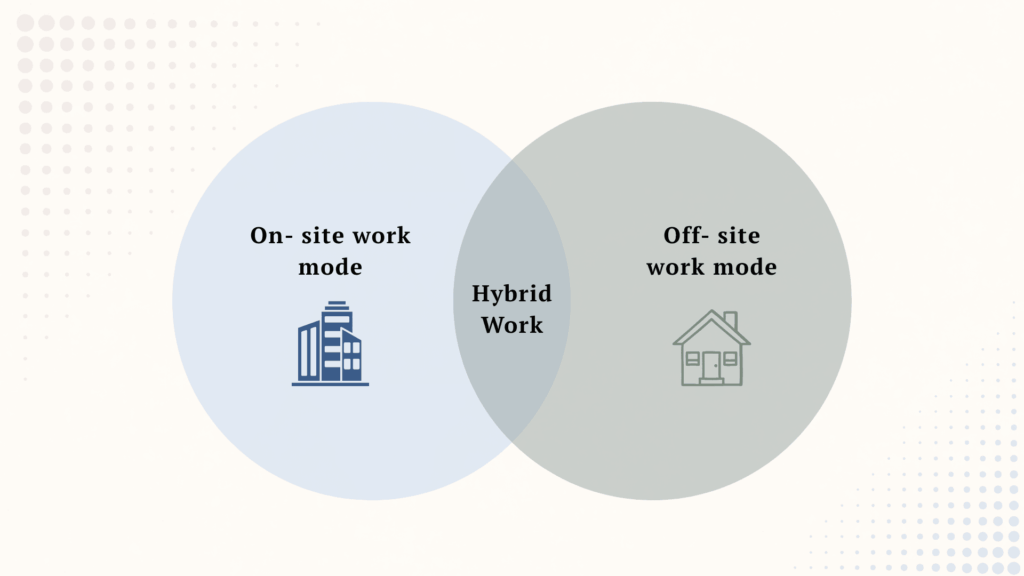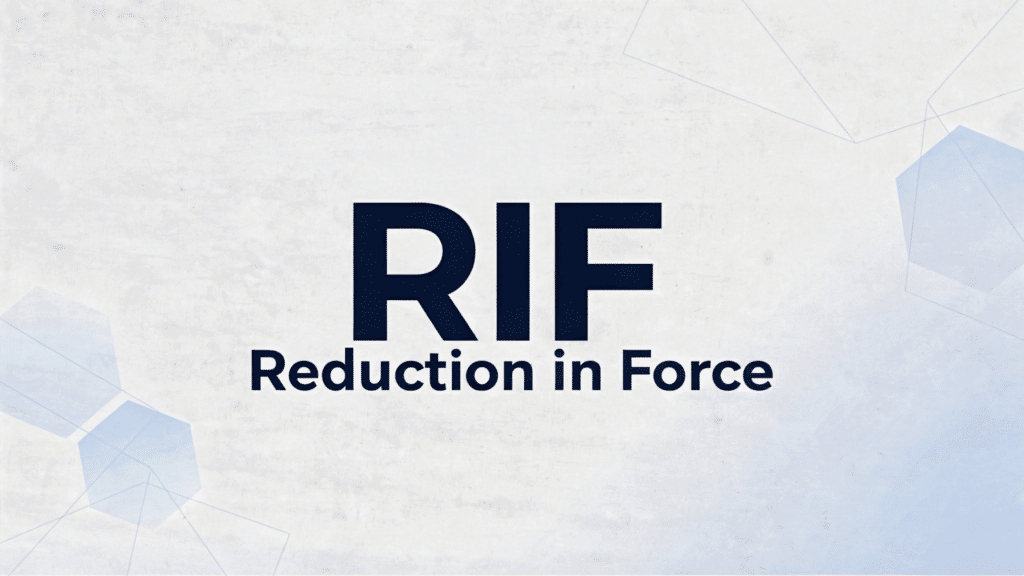When two equally qualified candidates interview for the same position, what determines who gets hired?
The answer lies in possessing the right good qualities for a job that employers truly value.
In today’s competitive job market, technical skills and degrees are just the baseline.
Employers seek candidates who bring strong personal and professional attributes that add genuine value to their organizations.
These traits are key to long-term career growth, as employers seek candidates who show both competence and strong character for advancement and meaningful careers.
Here are some valuable key qualities of a good employee that employers consistently value.
How do These Job Qualities Matter in Career Success?
Employers value both technical expertise and personal attributes when choosing the right candidate.
A balance of hard and soft skills ensures you perform well in your role while also contributing positively to the workplace.
- Hard Skills: Technical knowledge, certifications, industry-specific expertise, and job-related tools.
- Soft Skills: Communication, teamwork, adaptability, leadership, problem-solving, and emotional intelligence.
- Combined Impact: Hard skills show you can do the job; soft skills prove you can thrive, grow, and work effectively with others.
22 Essential Job Qualities Employers Look For

Here are qualities for a job that go beyond technical skills, focusing on personal traits that help employees succeed and build their careers:
1. Communication Skills
Exchanging information effectively and facilitating smooth data flow within organizations.
Strong communicators can:
- Present complex information in accessible formats
- Adapt their messaging style for different audiences
- Facilitate productive information sharing sessions
They excel at both written and verbal information exchange, ensuring data moves efficiently throughout the company and reducing miscommunication that can impact operational effectiveness.
Why this quality matters: Clear communication prevents costly misunderstandings and keeps teams aligned on goals and priorities.
2. Adaptability
Being flexible when facing workplace changes and new business needs.
Workers who adapt well accept new technology, updated ways of doing things, and changing priorities instead of fighting them.
They see change as a chance to grow and quickly adjust how they work.
Why this quality matters: Adaptable employees help companies stay competitive during market changes and technological shifts.
3. Teamwork
Working well with others toward shared goals through working together and sharing duties.
This includes:
- Sharing credit for wins
- Helping coworkers during tough times
- Building good relationships across different departments
Why this quality matters: Strong teamwork leads to better problem-solving, higher productivity, and improved workplace morale.
4. Problem-Solving Skills
Looking at complex problems step by step and creating practical solutions that work.
Good problem-solvers break down tough situations into smaller parts, gather important information, and think creatively when normal methods don’t work.
Why this quality matters: Effective problem-solvers save companies time and money by resolving issues quickly and preventing future complications.
5. Time Management
Organizing tasks well, setting realistic priorities, and meeting deadlines without hurting quality.
People with strong time management skills can:
- Handle multiple jobs
- Give the right amount of time to different activities
- Stay productive under pressure
Why this quality matters: Good time management increases productivity, reduces stress, and ensures important deadlines are consistently met.
6. Work Ethic
Being dedicated to producing quality work all the time, whether someone is watching or not. This means:
- Giving your best effort in all tasks
- Taking personal responsibility for results
- Keeping high professional standards
Why this quality matters: A strong work ethic builds trust with managers and often leads to increased responsibilities and career advancement.
7. Attention to Detail
Being careful and accurate in all work activities while staying focused on quality standards.
Detail-focused people catch possible mistakes early in processes, make sure their work meets requirements, and take satisfaction in delivering polished, professional results.
Why this quality matters: Attention to detail prevents expensive mistakes and maintains the company’s professional reputation with clients.
8. Positive Attitude
Approaching work challenges with hope, excitement, and helpful energy that affects team relationships. Positive employees:
- Keep professional behavior during difficult situations
- Boost team spirit through encouragement
- Handle setbacks gracefully without focusing on negative parts
Their outlook often spreads to others, creating a more pleasant work environment.
Why this quality matters: Positive attitudes improve team morale, reduce workplace stress, and create a more enjoyable work environment for everyone.
9. Emotional Intelligence
Understanding and managing your own emotions while accurately reading and responding to how others feel.
This skill helps professionals handle workplace conflicts diplomatically, build stronger relationships with coworkers and clients, and stay calm during stressful situations.
Why this quality matters: Emotional intelligence improves workplace relationships, reduces conflicts, and enables better customer service.
10. Leadership
Inspiring and guiding others toward shared goals, no matter what your official title or position in the company. Leaders:
- Take charge when situations need action
- Motivate team members to perform their best
- Help solve complex problems through group decision-making
They show integrity and build trust with coworkers.
Why this quality matters: Leadership skills prepare you for management roles and help teams achieve better results through motivation and guidance.
11. Critical Thinking
Looking at information objectively, considering different viewpoints, and making well-thought decisions based on facts rather than guesses.
Critical thinkers ask thoughtful questions, consider multiple views before reaching conclusions, and can spot potential problems in reasoning or processes.
Why this quality matters: Critical thinking prevents costly business mistakes and helps companies make better strategic decisions.
12. Dependability
Being consistently reliable and trustworthy in all professional commitments and responsibilities.
Dependable employees:
- Show up on time
- Follow through on promises
- Meet agreed deadlines
- Can be counted on during both routine tasks and challenging situations
Why this quality matters: Dependability builds trust with managers and colleagues, often leading to more important projects and career opportunities.
13. Creativity
Coming up with fresh ideas, innovative approaches, and original solutions that add value to business operations.
Creative employees bring unique viewpoints to brainstorming sessions and aren’t afraid to suggest unconventional approaches that might work better.
Why this quality matters: Creativity drives innovation and helps companies stay ahead of competitors by finding new solutions and opportunities.
14. Interpersonal Skills
The ability to build strong, lasting professional relationships with coworkers, clients, and stakeholders through trust, mutual respect, and understanding. This includes:
- Establishing rapport with people from different backgrounds
- Actively listening and valuing others’ perspectives
- Maintaining professional relationships through challenges and conflicts
Strong relationship-building skills create networks that support collaboration, open communication, and long-term business success.
Why this quality matters: Good interpersonal skills lead to stronger professional networks, better collaboration, and increased career opportunities.
15. Self-Motivation
Working independently with little supervision while staying productive and taking initiative to find improvement opportunities. Self-motivated employees:
- Set personal goals for professional growth
- Look for ways to contribute beyond their basic job requirements
- Stay productive without constant direction or close management
They are proactive in solving problems and advancing their skills.
Why this quality matters: Self-motivation demonstrates leadership potential and makes you valuable in remote work situations and independent projects.
16. Conflict Resolution
Handling disagreements constructively by encouraging open dialogue and finding solutions that benefit everyone.
This involves listening carefully to all parties, understanding different viewpoints, finding common ground, and helping people work through differences professionally.
Good conflict resolution keeps team harmony while addressing real concerns.
Why this quality matters: Effective conflict resolution maintains team productivity and creates a healthier, more collaborative work environment.
17. Technical Skills
Staying current with industry-specific tools, software, and technology developments relevant to your field. This includes continuously updating your knowledge through:
- Training programs
- Certifications
- Self-directed learning
Technical knowledge shows commitment to professional growth and ability to adapt to changing workplace requirements and industry standards.
Why this quality matters: Up-to-date technical skills keep you relevant in your field and competitive in the job market as technology evolves.
18. Cultural Fit
Matching personal values and work style with your company’s mission, values, and work culture.
Employees who fit well culturally understand and embrace company norms, contribute positively to workplace atmosphere, and support company initiatives.
Why this quality matters: Cultural fit increases job satisfaction, improves team dynamics, and often leads to longer tenure with organizations.
19. Learning Agility
In today’s rapidly changing workplace, continuous learning and adaptation are important for staying relevant and advancing professionally.
They don’t see training or education as burdens but as opportunities to expand their capabilities and increase their value to current and future employers.
Why this quality matters: Learning agility ensures you stay relevant as industries change and positions you for new career opportunities.
20. Accountability
Taking full ownership of your actions, decisions, and results, including admitting mistakes and working to prevent similar problems.
Accountable employees don’t make excuses or deflect responsibility when things go wrong.
Instead, they focus on learning from errors and putting improvements in place.
Why this quality matters: Accountability builds trust with managers and demonstrates the maturity needed for leadership positions.
21. Analytical Thinking
Breaking down complex information to understand patterns and underlying causes.
Analytical thinkers examine data objectively, identify trends, and draw logical conclusions based on evidence rather than assumptions.
Why this quality matters: Analytical thinking enables better decision-making and helps companies solve complex problems more effectively.
22. Resilience
The mental strength to bounce back from setbacks and maintain performance under pressure.
Resilient employees handle stress well, recover quickly from failures, and view obstacles as learning opportunities.
Why this quality matters: Resilience helps you maintain performance during challenging times and demonstrates the stability needed for leadership roles.
How Can You Identify and Develop These Qualities in Your Team?
Building strong teams requires smart managers who can spot talents, support growth, and create environments that develop skills.
Here are some key strategies to implement:
- Regular Performance Reviews: Assess employee strengths and areas for improvement through structured evaluations
- Peer Feedback: Ask coworkers for different perspectives on team members’ abilities and workplace behavior
- Training and Mentorship: Offer targeted programs and pair experienced employees with developing team members
- Clear Feedback and Recognition: Provide constructive guidance and praise employees who demonstrate important qualities
- Growth Opportunities: Assign challenging projects and create advancement paths for those showing strong workplace traits
- One-on-One Development: Schedule regular conversations to discuss individual growth and career goals
Conclusion
These important qualities represent the foundation of workplace success and career advancement.
You now understand what employers truly value and have a clear roadmap for professional growth.
Start small, pick one or two qualities that resonate with you and begin developing them through daily practice.
These good qualities for a job will make you more valuable and open doors to better opportunities.
What quality will you focus on developing first?
Share your thoughts in the comments below and help others by sharing this guide with your professional network.
Frequently Asked Questions
What Are the 5 C’s of Soft Skills?
The 5 C’s of soft skills are communication, collaboration, critical thinking, creativity, and confidence.
What Jobs Require Strong Soft Skills?
Jobs in customer service, management, healthcare, education, and sales require strong soft skills. These roles demand effective communication, problem-solving, teamwork, and emotional intelligence to interact with clients, coworkers, and patients.
What Is the Purpose of Career Skills?
Career skills, including both soft and hard skills, are essential for job performance, career advancement, and professional growth.










